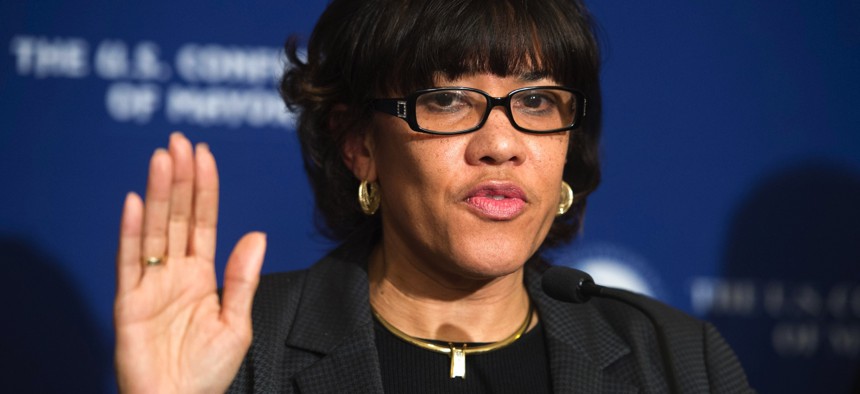Flint’s Mayor Calls for Federal Aid for Water Crisis

Flint Mayor Karen Weaver Cliff Owen / AP Photo
In a drama-filled event at the U.S. Conference of Mayors winter meeting, Dr. Karen Weaver was able discuss the crisis. But Baltimore’s mayor wasn’t so lucky when she tried to speak about community policing.
WASHINGTON — During the U.S. Conference of Mayors winter meeting’s opening press conference on Wednesday, the mayor of Flint, Michigan, stressed the importance of vital federal aid and assistance to deal with an ongoing water crisis.
Dr. Karen Weaver presented Flint as a cautionary tale to other mayors of what can happen when public health concerns over the safety of drinking water go unaddressed for more than a year.
While recent resignations within the Michigan Department of Environmental Quality and Gov. Rick Snyder’s strategy to fix the problem—which he outlined in his State of the State address on Tuesday—are a start, she said, rebuilding public trust won’t happen overnight.
“The state is ultimately to blame,” Weaver said. The decision to switch Flint’s municipal water system source from Detroit’s regional water system to the Flint River was made by the city’s state-appointed emergency financial manager who was interested in finding a less expensive source of water.
“We know the buck stops with the governor, but there is enough blame to go around,” Weaver said.
The mayor’s current focus is on securing Flint the resources it needs to weather the crisis—federal assistance a critical component.
Weaver acknowledged Flint is a “predominately African American” city but said the water crisis was a “class issue” as well.
“Water is a basic human right,” she said. “Everybody deserves clean water.”
Flint’s mayor was afforded a modicum of decorum unreserved for any of the other mayors who spoke at the press conference, especially Baltimore Mayor and USCM President Stephanie Rawlings-Blake.
Shortly into Rawlings-Blake’s prepared remarks, when she broached the subject of community policing, a few hecklers claiming to be from her city began jeering her with cries of “Black lives matter,” “You failed us” and about Charm City’s minority incarceration rate.
One woman stood in front of Baltimore’s mayor with a sign reading, “16 Shots & A COVER UP #LaquanMcDonald #RESIGNRAHM,” aimed at Chicago Mayor Rahm Emanuel, who’s enduring criticism for his handling of police-involved killings of African-American residents.
None of the hecklers were removed, leaving Rawlings-Blake and company to talk over them while stating the importance of cities in 2016 campaign trail conversations.
Nearly all 381 U.S. metropolitan areas are projected to see economic development and job growth in 2016, Baltimore’s mayor said, making it important for the next president to help working families.
“Cities have growing needs, and those needs need to be addressed,” Rawlings-Blake said.
New Orleans Mayor and USCM Second Vice President Mitch Landrieu touched on another point of the conference’s 2016 urban agenda: transportation. Bipartisan investment in infrastructure is needed, he said, to create 10 to 12 million jobs and continuing pushing down unemployment.
Dave Nyczepir is a News Editor at Government Executive’s Route Fifty.
NEXT STORY: Austin wants 311 app feedback






